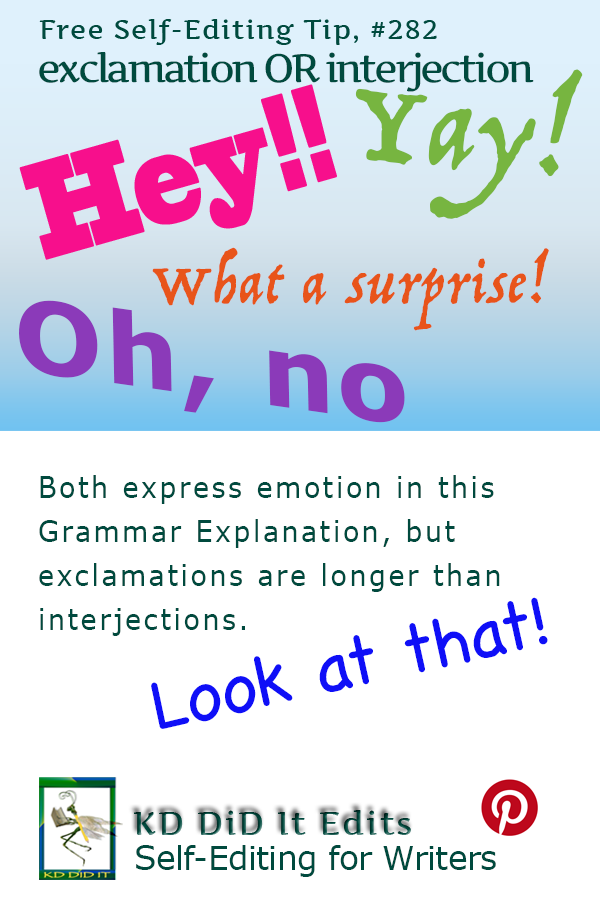Revised as of
7 Feb 2023
Exclamations and interjections are easily confused — because not all exclamations are interjections but all interjections are exclamations.
| Exclamation | Interjection |
|---|---|
| Both can convey emotion
Both may use an exclamation mark |
|
| A single word, a phrase, or a sentence | Usually a single word (which can be its own sentence) |
| Must use grammatical rules | Doesn’t use grammatical rules |
| Can demand or order | |
Exclamations and/or interjections are most commonly used in dialogue and are quite effective in showing what the character feels as well as reinforcing your character’s, um, character, i.e., social class, educational level, etc.
Punctuation as a Guide?
“Even final punctuation is not a reliable guide. Declaratives, for example, can end with periods, exclamation marks, or even question marks, as in That pie was homemade?” (Owen).
Exclamation marks (and sometimes periods) are used with exclamatory phrases or sentences, while interjections can take exclamation marks, commas, or question marks.
Whichever you choose (sometimes a question mark is the ideal), determine how strong you want the emotion to seem.
You may also want to read the Properly Punctuated posts “Period” and “Exclamation Mark“.
Grammar Explanations is . . .
. . . an evolving list of the structural rules and principles that determines where words are placed in phrases or sentences as well as how the language is spoken. Sometimes I run across an example that helps explain better or another “also known as”. Heck, there’s always a better way to explain it, so if it makes quicker and/or better sense, I would appreciate suggestions and comments from anyone on an area of grammar with which you struggle or on which you can contribute more understanding.
If you found this post on “Exclamation and/or Interjection” interesting, consider subscribing to KD Did It, if you’d like to track this post for future updates.
| Exclamation | Interjection | ||
|---|---|---|---|
| Definition: A word, phrase, or clause that expresses strong emotion, such as surprise, pleasure, or anger.
It may be followed by an exclamation mark or a period. A.k.a., exclamatory, exclamative |
Definition: A word or very short phrase that conveys a sudden emotion or a strong feeling such as surprise, disgust, joy, excitement, or enthusiasm.
An interjection is not grammatically related to any other part of the sentence. |
||
| Anatomy of an Exclamative | |||
| Rule: Usually starts with what or how, followed by the subject and verb. Although, the subject and verb can be inverted, sounding archaic or literary.
Credit to: Owen. |
|||
| What a delicious pie that was!
“What a piece of work is a man!” – Shakespeare, Hamlet I won the lottery! I just don’t know what happened! Come here now! You were meant to be here last week! I’m so hungry! |
Really? I can’t believe this.
Yay! We are getting holidays today. Ow! My leg hurts. |
||
| Rule: An interjection may be included in an exclamatory sentence (usually at the start) to express a sentiment such as surprise, disgust, joy, excitement, or enthusiasm. | Rule: A short utterance that usually expresses emotion and is capable of standing alone.
It is typically followed by an exclamation point. |
||
| No, go away.
Indeed, I intend to leave as soon as possible. Oh no, Mr. Bill!! It is cold, indeed. Legend:
|
Ow! That hurt! Ooh! You should try out for the ballet. |
||
| Rule: Express greetings or congratulations. | |||
| Go, team!
Hi, George. Well done, lads! How wonderful! |
Hello!
Yay! |
||
| Rule: Some are sounds. | |||
| Mmmm, my compliments to the chef. | Phew! I am not trying that again.
Humph! I knew that last week.
|
||
| Rule: Some interjections are more than one word. | |||
| Oh, really? I doubt that.
Holy moly! She won! What’s up? Excuse me! Oh dear! Thank God! |
|||
| Rule: Stretch the word to strengthen the emotion. | |||
| Oohhhhh, such a cute kitty!
Ewwwwww, spiders are G.R.O.S.S. Ahhhh, that feels so good. |
Ooooh! Ickkk!! Ack!! |
||
| Rule: Sometimes it ends in a question mark. | |||
| What did you do?
What a pain! How nice. |
Huh? What? |
||
| Rule: Make an exclamation from an interrogative. | |||
| Have I got news for you! Your boss got fired yesterday.
Isn’t it cute! Are you an idiot! |
|||
C’mon, get it out of your system, bitch, whine, moan . . . which words are your pet peeves? Also, please note that I try to be as accurate as I can, but mistakes happen or I miss something. Email me if you find errors, so I can fix them . . . and we’ll all benefit!
Satisfy your curiosity about other Grammar Explanations by exploring its homepage or more generally explore the index of self-editing posts. You may also want to explore Book Layout & Formatting Ideas, Formatting Tips, Grammar Explanations, Linguistics, Publishing Tips, the Properly Punctuated, Word Confusions, Writing Ideas and Resources, and Working Your Website.
Resources for Exclamation and/or Interjection
Admin. “Difference Between Interjection and Exclamation.” Difference Between.com. 18 April 2015. Web. 6 Jan 2020. <https://www.differencebetween.com/difference-between-interjection-and-vs-exclamation/>.
Nordquist, Richard. “A List of Interjections in English: Holy Cow! 101 English Interjections and Exclamations.” Thought.co. 7 Sept 2019. Web. 4 Jan 2020. <https://www.thoughtco.com/interjections-in-english-1692798>.
Owen, Jonathon. “How Wrong Everyone is About Exclamatives!” Aces. 16 September 2019. Web. 15 October 2019. <https://aceseditors.org/news/2019/how-wrong-everyone-is-about-exclamatives>.
Sanders, Jesper. “100+ Exclamations: The Ultimate Interjection List.” Survey/Anyplace. 23 March 2017. Web. 4 Jan 2020. <https://surveyanyplace.com/the-ultimate-interjection-list/>.
Pinterest Photo Credits:
My own work.


